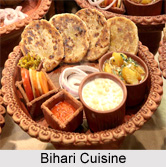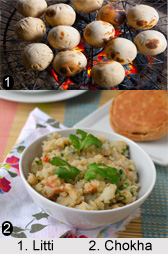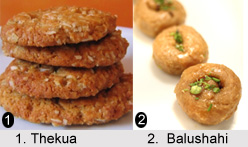 Bihar Cuisine is predominantly vegetarian because traditional Bihar society, influenced by Buddhist and Hindu values of non-violence, did not eat eggs, chicken, fish and other animal products. However unlike Gujarat and other communities of the South, non-vegetarian food is quite acceptable in few traditional homes of Bihar. The cuisine of Bihar is similar to a great extent to North Indian Cuisine but has an influence from other East Indian Cuisine for example like Bengali Cuisine.
Bihar Cuisine is predominantly vegetarian because traditional Bihar society, influenced by Buddhist and Hindu values of non-violence, did not eat eggs, chicken, fish and other animal products. However unlike Gujarat and other communities of the South, non-vegetarian food is quite acceptable in few traditional homes of Bihar. The cuisine of Bihar is similar to a great extent to North Indian Cuisine but has an influence from other East Indian Cuisine for example like Bengali Cuisine.Variety of Food in Bihar Cuisine
Bihar cuisine offers several tasty morning foods which have their immense nutritional value, some of them are "Sattu", considered as an appetizer, is taken with water and is served with pickle, onion and green chillies, is a common intake of the laboured class. Another preparation of Sattu is prepared with raisins, milk, cashew nuts and pista, a favourable drink of the elite. Other morning foods, prepared with Sattu are "Parantha" in which Sattu is mixed with spices and stuffed, and another one is "Litti" which come in large varieties, cooked with flour, ginger, garlic and pepper and served with chutney, curry or pickle. Among the popular as well as of high nutritional value food is "Chokha" which is a preparation made with mashed potatoes and other vegetables and are garnished with onion, chillies and mustard oil. "Baingan ka Chokha" is a famous dish of Bihar. "Bachka" is a fried food and it needs to slice the vegetables and fried in a chickpea batter to make these crispy fritters. "Chura Dahi" (flattened rice and curd), taken with sugar or jaggery, is a favourite breakfast among the people of Bihar. Bihar cuisine encompasses different types of bread and Parathas such as "Onion Paratha", "Potato Paratha", "Sattu Paratha", "Makai Roti", "Dal Puri", "Makuni" etc. "Samosa" and "Kachoris" are enjoyed as fast food all over Bihar. "Kachori" is prepared in various ways and are of different kinds like, "Sattu ki Kachori". "Pitha" and "Bakha", steam cooked is mainly prepared in North-Eastern Bihar. "Makhana", mainly water fruit, is prepared from lotus seeds, with milk and sugar is must during religious festivals and marriages. It can also be cooked as a salty puff. Makhana or 'Chura Bhunja' is paired with uncooked sprouts soaked in water and cherished by the locale.

Bihar Cuisine has several ramifications of vegetarian and non-vegetarian foods. Most of the inhabitants of Bihar prefer to have vegetarian dishes which consist of ‘Rice’, ‘Roti’, ‘Lentils’, ‘Pickle’ and ‘Tarkari’, ‘Aloo Chokha’, ‘Kala Chana Ghoomni’, ‘Chana Dal ki Kachree’, ‘Subzi Jhingi’ or ‘Nenua Chana’, ‘Kafta’, ‘Shahi Paneer’, ‘Vegetable Korma’, ‘Palak Paneer’, ‘Bharwan Karela’ etc.
Bihar has a large number of Buddhists and Jains who consume a strict vegetarian diet and others prefer to have non-vegetarian foods. The Kayasthas of Bihar likes to consume healthy but vegetarian dishes as their meal. The Maithil Brahmins follow a tradition to offer goat or meat as ‘Prasad’ to God in many religious festivals. In Bihar, offering meat to a guest is considered as sacred. The Bihar cuisine has some special dishes among which "Tilba", "Chura", "Chitba", "Pitthow" and "Makhana" can be named. "Kadhi" is preferred among the Biharis, eaten with plain rice. "Dhuska" is a deep fried, salted item prepared from a mixture of powdered rice and ghee but is one of the many dishes of Bihar.
Tribal Food in Bihar Cuisine
Bihar Cuisine includes the food habits of the aboriginal tribes who are the residents of Chotanagpur, the Southern half of Bihar. The tribes mainly take boiled cereals, a curry of boiled vegetables or meat or edible roots seasoned with salt and chillies and millet. Among the tribal specialties are "Asur Pitha" (prepared from the flour of Mahua) and "Sauria Ghata" which is cooked like rice with the crushed maize. "Korwa Lata" and "Korwa Jatangi" are also famous among the tribes.
 The tribes relish a beverage called "Handia" which is prepared by fermenting rice with the help of biro (a medicinal cake), partially cooked over fire in a Handi (earthen cooking pot). Then it is cooked and mixed with powdered biro. Then the pot is kept in a cool place for some days and after a certain time the Handia gets ready to be distributed.
The tribes relish a beverage called "Handia" which is prepared by fermenting rice with the help of biro (a medicinal cake), partially cooked over fire in a Handi (earthen cooking pot). Then it is cooked and mixed with powdered biro. Then the pot is kept in a cool place for some days and after a certain time the Handia gets ready to be distributed.For more, visit the link below: